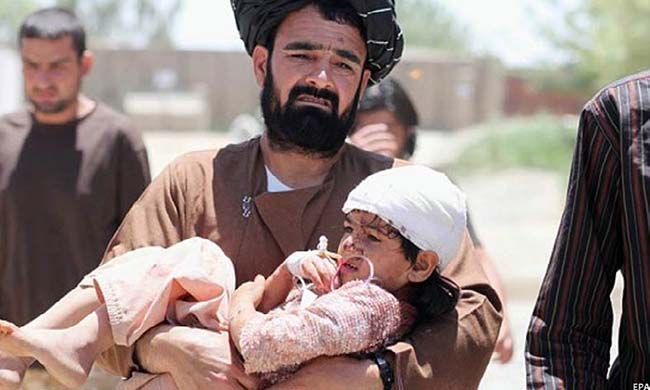According to a report released by UN mission in Afghanistan, civilian casualties in Afghanistan have increased two percent in the first three months of this year compared to the same period last year. Despite the increase in overall civilian fatalities, there has been 13 percent decrease in civilian deaths in this period. Sixty percent of the casualties of the civilian population are attributed to the armed anti-government groups while government forces and pro-government militias are taken accountable for 19 percent of the civilian casualties. With the intensification of the war and violence in Afghanistan, civilian casualties have been constantly on the rise in the country in recent years. The announcement over the rise of civilian casualties is coming at a time when the Taliban have resumed their annual offensive that is expected to further lead to rise of civilian casualties in the country.
With the start of the Taliban’s Omari operation, civilian population in Afghanistan will continue to suffer the most and there will be further increases in civilian casualties. The sustained increase in fatalities of civilians in Afghanistan in recent years is a result of the deterioration of security and the heightened war and violence across the country. The sharp rise of casualties of children is particularly worrisome. With the peace initiative in stalemate and the war at its peak, civilian casualties will continue to rise and there is no prospect for end of the suffering of the civilian population unless there are certain measures taken by all relevant parties including the Taliban, the Afghan government and the United Nations.
All parties of the war are obliged to international war-time laws and regulations including the Taliban and other non-state actors. In Afghanistan, protection of civilian should be a priority for all parties of the war. All sides should do their best to prevent suffering and fatalities of civilians. According to the UN annual reports, the insurgent groups, in particular the Taliban, are accountable for a large part of the civilian casualties in Afghanistan. The militant groups should be taken accountable for their crimes by the international community and the UN and other pro-human rights groups. There needs to be sustainable pressures over the militant groups to demonstrate explicit commitments for avoiding using civilian as human shield and taking shelter in civilian-populated areas.
The United Nations and the Afghan government need to promote and seek negotiating channels with the Taliban and other militant groups over the issue of protecting civilians. The Taliban have time and again stressed that they are morally bound to avoid suffering of civilians and innocent people. There is room for discussions between the Afghan government and the UN on one side and the Taliban on the other side. There have long been unofficial contact lines between politicians and pro-government figures and the Taliban members. The Afghan government made efforts to start peace talks with the Taliban to bring an end to the conflict in the country. Despite that the efforts did not succeed to bring the Taliban to the table of negotiations, it created a mechanism for multi-lateral cooperation to pursue the peace efforts and persuade the Taliban for negotiations.
The Afghanistan needs to include the issue of civilian casualties to any future peace plan. Also the issue of civilian casualties should be included in the peace agenda of the four-nation coordination group which is tasked with preparing the ground for resumption of negotiations with the Taliban. The United Nations has long been persuading the Taliban to care for civilians and avoid deaths of civilian populations in the battlefields. However, the militants have persistently committed atrocities against civilians despite that the Taliban leaders claim respect for dignity and safety of civilian and innocent people. Most of the casualties occur in bombings for which the Taliban are responsible the most, and ground battles between government forces and the militant groups while the militants use civilian populated areas as shelters and safe havens.
The civilian casualties should be viewed as a major aspect of the conflict in the country and should be dealt with through intensive negotiations along other measures by the government. The high rate of civilian deaths further endangers the efforts to stabilize the country and boost public confidence to the credibility of the state and the Afghan security forces. The government must view the issue as a major aspect of the conflict and take specific measures to decrease suffering of the civilian. The government can make it a top priority in the peace efforts and the conditions for peace negotiations with the Taliban. In addition, it has the opportunity to pursue the issue through international agencies like the United Nations Security Council and platforms of regional cooperation. Neighboring countries and other parties who have influence over the Taliban can play a role in persuading the Taliban to respect international law on protecting civilians.
The Taliban must remain committed to avoid civilian casualties through implementing particularly war regulations. Each year, the Taliban leader used to direct guidelines to the group’s fighters and field commanders to prevent civilian casualties and avoid oppressing the innocent citizens. With the start of Omari operation, the Taliban are going to further scale up violence which makes the civilian populations particularly vulnerable. The Afghan government needs to focus on preventing the militants to take footholds in civilian areas in the far remote districts and rural areas. The issue of civilian casualties will test government’s ability to provide relative security and maintain order and stability which, in turn, will help to restore public confidence to the government and the Afghan security forces.
Home » Opinion » The Persistent Rise of Civilian Casualties
The Persistent Rise of Civilian Casualties
| Abdul Ahad Bahrami

